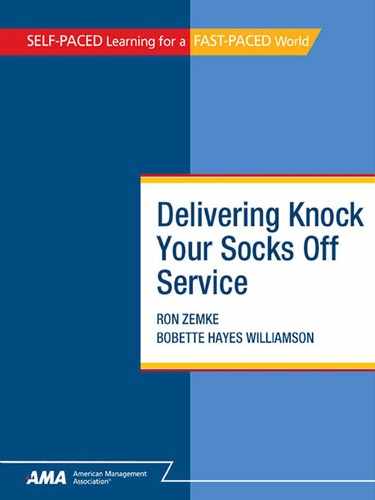Key Terms
Apology—Acknowledgment that things aren’t going right in the customer’s eyes.
Assurance—Knowledge, competence, courtesy and confidence service representatives show to customers. One of the five RATER factors.
Background questions—Questions asked at the beginning of a conversation to gather specific information about the other person, e.g., name, account number.
Blue rules—Rules that are important guides for doing work. Exceptions may be made for Blue rules.
Closed questions—Questions that can be answered with a yes or no or with a specific piece of information.
Confirmation questions—Questions that help confirm that the person asking the question has correctly understood the answer.
Empathy—Degree of caring and individual attention shown to customers. Acknowledging and affirming another’s emotional state. One of the five RATER factors.
External customers—People who buy your products and services. The source of revenue that funds continuing operations.
Forbidden phrases—Words or phrases that anger or frustrate customers.
Internal customers—Whoever benefits from the work you do or suffers when your work is done poorly or not at all.
Moment of truth—Anytime a customer comes in contact with any part of your organization and uses that contact to judge the quality of the organization.
Offstage—A place where you are safely away from the public eye. A place where you can let your emotions out. The opposite of onstage.
Onstage—Anywhere a customer can see or hear you. The opposite of offstage.
Open question—Questions that invite the respondent to provide details or explanations.
Previewing—Decreasing resistance to background questions by explaining up front why you need the information.
Probing questions—Questions that help you delve more deeply into a subject. May begin with who, what, where, when, why, or how.
RATER factors—Acronym for five factors by which customers measure the quality of service received. The factors are Reliability, Assurance, Tangibles, Empathy, and Responsiveness.
Red rules—Rules that cannot be broken.
Reliability—Providing what was promised, dependably and accurately. One of the five RATER factors.
Responsiveness—Helping customers promptly. One of the five RATER factors.
Service recovery—Taking positive actions that will lead disappointed customers back to a state of satisfaction with your organization.
Symbolic atonement—A step in the service recovery process. Providing a value-added gesture in a manner appropriate to the problem that says to the customer, “I want to make it up to you.”
Sympathy—Identifying with or taking on another person’s emotions.
Tangibles—Physical facilities and equipment, and appearance of employees. One of the five RATER factors.
Technomysticism—Customer attitude of seeing the capabilities of products and services as practically limitless because technology has moved or broken so many limits.
Transfer transformation—Transformation from nasty to nice that can occur in difficult customers when they are transferred by a customer service representative to a peer or supervisor.
